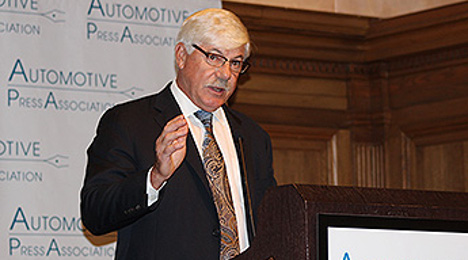More industry reaction percolated stemming from Tuesday’s decision by the U.S. Court of Appeals for the District of Columbia Circuit involving the Consumer Financial Protection Bureau, which on the same day handed out a $28.5 million enforcement action against Navy Federal Credit Union for what the regulator deemed to be improper debt collection actions.
To recap, a panel of three of the appeals court’s judges ruled in favor of a finance company that operates in the mortgage space, rescinding a $109 million enforcement action the bureau handed out nearly two years ago while calling the CFPB “unconstitutionally structured.”
After combing through the particulars of the 2-1 decision, three members of Clark Hill's Consumer Financial Services Regulatory & Compliance Practice Group shared an assessment that might lift executives and managers discouraged by the bureau operates.
In a commentary written by Thomas Brooks, Jane Luxton and Joann Needleman, they said the decision “may provide the financial services industry some comfort to challenge the bureau or force the bureau to be more thoughtful in its approach, but many consent orders are already in place, and stipulations of judgment in civil actions brought by the bureau have been entered by agreement of all parties.
“It is difficult to know what impact the court’s ruling will have on pending rulemakings on payday lending and those in the pipeline on arbitration and debt collection practices,” they continued in the assessment available here.
“In the near term, it seems likely that the bureau will seek rehearing from the full D.C. Circuit, given the signal importance of the decision. And there is little question that these developments will re-invigorate the calls to reform the CFPB, with strong views on all sides of the issue,” they went on to say.
Within hours of the appeals court announcement, the CFPB handed out its latest enforcement action. Bureau officials said they took action against Navy Federal Credit Union for “making false threats” about debt collection to its members, which include active-duty military, retired servicemembers and their families.
The bureau determined the credit union also unfairly restricted account access when members had a delinquent loan. According to the CFPB’s news release, Navy Federal Credit Union is correcting its debt collection practices and will pay roughly $23 million in redress to victims along with a civil money penalty of $5.5 million.
“Navy Federal Credit Union misled its members about its debt collection practices and froze consumers out from their own accounts,” CFPB Director Richard Cordray said. “Financial institutions have a right to collect money that is due to them, but they must comply with federal laws as they do so.”
The CFPB investigation found that Navy Federal Credit Union deceived consumers to get them to pay delinquent accounts. The bureau insisted the credit union falsely threatened severe actions when, in fact, it seldom took such actions or did not have authorization to take them.
The bureau also determined the credit union also cut off members’ electronic access to their accounts and bank cards if they did not pay overdue loans. Hundreds of thousands of consumers were affected by these practices, which occurred between January 2013 and July 2015.
As Clark Hill referenced, future actions like what the CFPB just took against Navy Federal Credit Union might be changing because of Tuesday’s appeal court ruling, which can be reviewed here. Writing for the majority, U.S. Circuit Judge Brett Kavanaugh gave what some observers might consider to be a scathing assessment of the bureau, which the Consumer Bankers Association found when it reviewed the ruling
“In short, when measured in terms of unilateral power, the director of the CFPB is the single most powerful official in the entire U.S. Government, other than the president," the court said. "Indeed, within his jurisdiction, the director of the CFPB can be considered even more powerful than the president. It is the director’s view of consumer protection law that prevails over all others. In essence, the director is the president of consumer finance."
Laurence Platt, a partner in Mayer Brown’s Washington, D.C., office and a member of the firm’s consumer financial services group, described the decision as being more of a “sweep” than the Boston Red Sox being ushered out of the Major League Baseball playoffs.
According to Platt, “For those who think that CFPB’s Richard Cordray has unbridled powers as the sole director of the CFPB, the U.S. Court of Appeals for the District of Columbia Circuit just proved otherwise in today’s highly anticipated decision involving PHH Corp.
“In a stinging rebuke to the CFPB, the court repudiated a key feature of the single director structure of the CFPB as well as the CFPB’s interpretations of a consumer credit law that it enforces,” Platt continued. “It sought to cure the purported flaw in the CFPB’s structure by providing that the director of the CFPB is subject to the supervision, direction and removal at will by the president of the United States. As written, the CFPB’s director is insulated from interference by the president and only can be terminated with cause.
“It’s a bigger sweep than the Cleveland Indians beating the Red Sox in three games to none,” he went on to say.
Reynolds and Reynolds recently released the Reynolds LAW Georgia F&I Library, which is a comprehensive catalog of standardized, legally reviewed finance and insurance (F&I) documents for franchised dealers in the state of Georgia.
The company now has developed more than 30 state-specific Reynolds LAW brand F&I documents libraries, surpassing the midway point to a goal of creating LAW F&I libraries for all 50 states.
“F&I paperwork can be exacting and demanding both for dealerships and for their customers,” said Jerry Kirwan, senior vice president and general manager of Reynolds Document Services. “The F&I forms in use are often sourced from different vendors, may be outdated, or may have other inconsistencies — all of which can raise compliance risk for dealers and add confusion for dealership personnel and car buyers.”
"With each state-specific F&I forms library, we’ve built a trusted resource for dealers to better manage all of the forms necessary to complete a deal; better meet federal, state, and city F&I paperwork requirements; and deliver a more consistent, rewarding experience to car buyers at the dealership,” Kirwan continued.
And now Reynolds is offering the services for stores in Georgia.
"Regulatory scrutiny is an ongoing concern for automotive retailers. The LAW Georgia F&I Library is a tool to help dealers meet compliance obligations and manage risk,” Kirwan said. “The documents in the library are regularly reviewed for legal sufficiency with the latest automotive regulations by Reynolds' industry-leading forms specialists alongside Reynolds' outside legal partners."
Kirwan noted that because the documents in the LAW Georgia F&I Library are written in consumer-friendly language, they are designed to help streamline the car-buying process and enhance the consumer experience with the dealership.
"The documents can help to create a clearer, more consistent, and more efficient F&I process for the F&I manager and for the consumer. And, because of those improvements to the overall F&I process, the overall consumer experience with the dealership can be improved,” he said.
The printed documents in the LAW Georgia F&I Library also are available in a digital format, which can help facilitate the conversion to laser-printed transactions and e-contracting. Reynolds Document Services maintains licensing agreements with all major providers of electronic F&I (e-F&I) solutions.
The Reynolds LAW brand F&I libraries contain a comprehensive suite of standardized F&I documents developed to help meet the business needs of new-vehicle retailers in the specific state.
Kirwan went on to mention each state-specific LAW forms library is designed to deliver the following for automotive retailers:
—Manage compliance risk: Reynolds forms specialists regularly review the documents in the LAW F&I Libraries for legal sufficiency with the latest automotive regulations. They work in conjunction with Reynolds' outside legal partners and, where applicable, state automobile dealer associations.
—Streamline F&I processes: By using the standardized vehicle deal documents in the LAW F&I Libraries, dealers can achieve a more consistent and effective F&I process in every transaction.
—Increase customer satisfaction: Documents in the LAW F&I Libraries are written in consumer-friendly language to help create a more transparent and understandable F&I process and improve the consumer experience with the dealership.
—Smooth the transition to electronic documents: The printed documents in the LAW F&I Libraries are also available in digital format, which helps facilitate the conversion to laser-printed transactions or e-contracting. Reynolds Document Services maintains licensing agreements with all major providers of electronic F&I (eF&I) solutions.
States available include: Alabama, Arizona, Arkansas, California, Colorado, Georgia, Hawaii, Idaho, Illinois, Indiana, Kentucky, Louisiana, Maryland, Massachusetts, Michigan, Missouri, Nevada, New Jersey, New Mexico, North Carolina, Ohio, Oregon, Pennsylvania, South Carolina, Tennessee, Texas, Utah, Virginia, Washington, West Virginia and Wyoming.
“To surpass the midway point of creating an F&I forms library for every state is a testament to our team's document development knowledge and compliance expertise, as well as to the printing and fulfillment capabilities of our forms manufacturing operation,” Kirwan said.
“We look forward to the completion of this project nationwide and to the ongoing work of maintaining the F&I forms libraries. Our team will continue to regularly review and update the documents to incorporate dealer and OEM feedback and keep pace with current legislation and regulatory requirements,” he went on to say.
Especially in subprime auto financing, delivering documents such as adverse action notices often is a regular part of doing business for finance companies.
To help with that mandated activity, CEDAR Document Technologies (CEDAR) — an online auto finance mobile loan servicing and multichannel document delivery provider — rolled out of a new service for finance companies in conjunction with browser-based loan origination system operator defi SOLUTIONS.
The companies highlighted this week that the new service can offer seamless integration to securely create and automate email delivery of adverse action letters. For finance companies, executives insisted this integration can offer a lower-cost method of automatically processing mandatory compliance letters efficiently and securely.
Adverse action compliance letters are a standard part of auto finance companies’ ongoing compliance requirements. Companies today can spend $2 or more for each non-approved applicant on processing, paper, envelopes, postage and other delivery costs. This cost can add up quickly, and the process is inefficient and outdated, according to defi SOLUTIONS chief operating officer Georgine Muntz.
“Minimizing lender cost and pain around adverse action letter processing has been a mission of mine for more than 15 years,” Muntz said. “Sending so many letters is environmentally wasteful and receiving them is a confusing and negative experience for consumers.
“I am thrilled to team up with CEDAR to turn this goal into a success for defi lenders,” she continued.
Muntz went on to stress that CEDAR’s deep knowledge of auto finance loan servicing, electronic document creation, storage, processing, and delivery coupled with defi’s expertise in auto lending origination technology makes for an ideal vendor partnership.
“With defi, letters will be generated automatically with the loan decision and securely sent to CEDAR either to mail or email, based on the consumers’ communication preferences. CEDAR is excited to expand its offerings to auto lenders beyond the fully integrated borrower web/mobile portal it offers for servicing auto loan consumers,” said Tom Womble, vice president of account services at CEDAR.
“This is a big win for both lenders and consumers,” Womble added.
National Automobile Dealers Association chairman Jeff Carlson went back to the media this week in an effort to sound another warning to Washington, D.C., about implementing policies that would inadvertently make buying, financing, trading-in, and servicing vehicles harder and more expensive for consumers.
Carlson, in NADA’s annual policy speech to the Automotive Press Association in Detroit, illustrated a number of real-world examples of how decisions in Washington and elsewhere are leading to increased prices for consumers when they go to buy new vehicles, when consumers obtain financing for those vehicles, and when consumers go to trade-in older vehicles for newer, cleaner and safer cars and trucks.
Carlson asked the gathering a series of questions:
—If Washington wanted to implement a policy that would add $600 to the cost of financing a new car, what would you call that?
—What about a policy that would take anywhere from $1,200 to $6,000 out of a customer’s pocket when they went to trade-in a used vehicle in order to buy a new one?
—How about a policy that would add thousands of dollars to every single new vehicle that every manufacturer makes, up and down their entire lineups, right out of the gate?
—Or what if new-car buyers had to pay hundreds of dollars more at the retail level because Washington thought it was no longer beneficial to consumers to have multiple, independent retailers competing with each other for the same customers?
Carlson continued, “Leaving aside what Washington calls it, what would that feel like as a customer? Do you think that customer feels like they just got taxed? You’re darn right they do.”
Carlson — who is also the president of Glenwood Springs Ford and Glenwood Springs Subaru in Colorado, as well as Summit Ford in Silverthorne, Colorado — has been leading the efforts of franchised dealers to remind leaders in Washington that their policy objectives can’t be achieved if vehicles become too expensive for consumers to afford.
“NADA is in the business of telling Washington that they better get it right. And getting it right means keeping it affordable,” Carlson said. “So what NADA has said to leaders in Washington is that: We understand your goals, and we agree with many of your goals, but we cannot accomplish those goals on the backs of our customers.”
“What we’re doing is standing up for our customers, and helping Washington find a better way that protects our customers but still gets us across the policy goal line,” he went on to say.
To see Carlson’s complete remarks, go to this website.
The green check mark I received through the online testing platform of the National Automotive Finance Association’s Consumer Credit Compliance Certification Program sure did look pretty this past weekend.
Instructors Patty Covington and Eric Johnson closed the Module 1 training session by encouraging students not to become frustrated if they didn’t secure an examination score high enough on the first attempt to proceed through the next segments. When the website indicated I received a score high enough above the 80-percent requirement on my first try, my joyful reaction looked similar to what you might see from an athlete at any level of competition who collected a victory.
To my fellow students who completed the opening module as well, I offer my sincere congratulations. I am presuming some of you had similar reaction because of the “firehose” of information we had to digest.
Now Modules 2 and 3 are ahead of me and the rest of the students currently enrolled in the program. The Hudson Cook partners provide great instruction, and the NAF Association offers resources that rival anything in another academic setting. However, recent regulatory developments published by SubPrime Auto Finance News provided some valuable study reinforcement, too.
First, the Department of Justice and the Office of the Comptroller of the Currency in separate actions penalized Wells Fargo to the tune of more than $24 million for what the agencies determined to be misdeeds involving the Servicemembers Civil Relief Act (SCRA) and repossessing vehicles.
When spelling out what Wells Fargo did, the regulators reiterated main points of the SCRA, which is becoming a headline-generating statute as proven by the developments involving HSBC Finance Corp., and COPOCO Community Credit Union, an institution in Michigan.
The SCRA components mentioned in the regulatory announcements included:
—Provide the 6-percent interest rate limit to servicemember obligations or liabilities incurred before military service.
—Accurately disclose servicemembers’ active duty status to the court via affidavits prior to evicting those servicemembers.
—Obtain court orders prior to repossessing servicemembers’ vehicles.
Remembering those news items — and what the regulators said — helped me to pick correct answers for SCRA questions.
Furthermore, the Federal Trade Commission recently filed a lawsuit against nine Los Angeles-area dealerships for using a wide range of “deceptive and unfair” sales and financing practices. What the FTC is alleging is nearly the opposite of how Patty and Eric explained compliant advertising, financing and delivery, including:
—Violating the FTC Act by charging some consumers for add-ons without their consent or falsely claiming the products were required or were free.
—Violating the Truth In Lending Act and Regulation Z, and the Consumer Leasing Act and Regulation M, for failing to clearly disclose required credit information and lease information in their advertising.
Again, these dealers haven’t been convicted, but the allegations are counter to what the program describes in detail and asks students to remember.
Now other program participants and I embark on deeper study of the alphabet soup of federal and state regulations that govern how auto financing is to be completed. TILA, ECOA, UCC, UDAAP, CFPB, FTC, SCRA, FCRA, DMV. They’re all in the regulatory lexicon that dealerships and finance companies need to understand for necessary compliance.
For industry professionals still considering whether to embark the training journey, let me reiterate that the NAF Association has put together a superb program. Executive director Jack Tracey and member services coordinator Cindy Sly can explain in more detail about how to get enrolled and why operations large and small can benefit. Just go to their website at www.nafassociation.com.
Or just watch the headlines distributed by SubPrime Auto Finance News. I have no doubt more enforcement actions are coming soon judging by the volume arriving this year alone. In my humble opinion, it’s further necessitating dealerships and finance companies to have as many trained professionals as their budgets can allow.
In the meantime, some of my upcoming evenings will be spent with my laptop, poring over regulations and looking to secure more of those pretty, green check marks.
Nick Zulovich is the senior editor of SubPrime Auto Finance News and is sharing updates about his journey to through the NAF Association’s Consumer Credit Compliance Certification Program. He can be reached at [email protected].
Two noncompliant practices consumer advocates often cite to criticize how financing happens at dealerships — yo-yo financing and payment packing — appeared in the rundown of charges made by the Federal Trade Commission against nine Los Angeles-area dealerships and their owners.
This week, the FTC asserted these stores used a wide range of “deceptive and unfair” sales and financing practices, according to an action filed in the U.S. District Court for the Central District of California that seeks to end these practices and return money to consumers.
Officials indicated this matter is the FTC’s first action against a dealer for yo-yo financing tactics: Using deception or other unlawful pressure tactics to coerce consumers who have signed contracts and driven off the dealership lots into accepting a different deal.
The FTC also alleges that the defendants packed extra, unauthorized charges for “add-ons,” or aftermarket products and services, into vehicle installment contracts.
The defendants are:
—Universal City Nissan doing business as Universal Nissan
—Sage Downtown doing business as Kia of Downtown Los Angeles
—Glendale Nissan/Infiniti doing business as Glendale Infiniti and Glendale Nissan
—Valencia Holding Co. doing business as Mercedes-Benz of Valencia
—West Covina Auto Group doing business as West Covina Toyota and West Covina Toyota/Scion
—West Covina Nissan
—Covina MJL doing business as Sage Covina Chevrolet
—Sage North Hollywood Sage Pre-Owned
—Sage Vermont doing business as Sage Hyundai
Along with the Sage Holding Co. and Sage Management Co., the FTC also charged:
—Joseph Schrage, who is also known as Joseph Sage
—Leonard Schrage, who is also known as Leonard Sage
—Michael Schrage, who is also known as Michael Sage
According to the FTC’s complaint, the defendants enticed consumers — particularly financially distressed and non-English speaking consumers — into their dealerships with print, Internet, radio and television ads that made an array of misleading claims. The ads included that vehicles are generally available for the advertised terms and that consumers can buy vehicles for low prices, finance with low monthly payments, or make low down payments.
Other allegedly misleading claims included that consumers can finance the purchase of vehicles — when in fact they are lease offers — and that the defendants will pay off consumers’ trade-in vehicles, despite the fact that consumers ultimately are responsible for paying off any amount owed on the trade-in.
The FTC also alleged that the defendants use phony online reviews to tout their dealerships and discredit negative reviews that highlighted their unlawful practices. They and their employees or agents allegedly post positive, five-star online reviews that purport to be from objective or independent reviewers without disclosing their relationship to the dealerships.
In addition to the deceptive advertising and marketing allegations, the FTC has charged that several financing tactics of the defendants are deceptive and unfair. As part of the sales and financing process, the defendants offer add-ons such as extended warranties, guaranteed asset protection (GAP) and maintenance or service plans.
The FTC alleged the defendants have violated the FTC Act by charging some consumers for add-ons without their consent or falsely claiming the products were required or were free.
And according to the complaint, in some instances after the consumers have signed contracts, the defendants falsely represent that consumers are required to sign a new contract with different terms. In other instances, the defendants tell consumers who have completed finance contracts that the contracts are cancelled and falsely represent that the defendants are permitted to keep consumers’ down payments or trade-ins.
When consumers requested compliance with the terms of the contract or refuse the defendants’ demands, the FTC asserted the defendants, in some instances, have falsely represented that consumers will be liable for legal action, including lawsuits, repossession or criminal arrest for a stolen vehicle.
Furthermore, the FTC’s complaint also charges the defendants with violating the Truth In Lending Act and Regulation Z, and the Consumer Leasing Act and Regulation M, for failing to clearly disclose required credit information and lease information in their advertising.
The commission vote authorizing the filing of the complaint against the Sage Auto Group defendants was 2-1, with commissioner Maureen Ohlhausen dissenting.
“The car-buying process is a two-way street,” said Jessica Rich, director of the FTC’s Bureau of Consumer Protection. “The FTC expects dealers to honor their contractual obligations, and will pursue those who use yo-yo financing tactics and pack unwanted costly add-ons onto consumers’ contracts.”
Another action involving regulators leveraging the power of the Servicemembers Civil Relief Act (SCRA) surfaced on Thursday afternoon.
The Justice Department announced that Wells Fargo Bank, doing business as Wells Fargo Dealer Services, has agreed to change its policies and pay more than $4.1 million to resolve allegations that it violated the SCRA by repossessing 413 vehicles owned by protected servicemembers without obtaining a court order.
In a separate announcement, the Office of the Comptroller of the Currency (OCC) assessed a $20 million civil money penalty against Wells Fargo for the same infractions.
DOJ officials explained the settlement, which is still subject to court approval, was filed in the U.S. District Court for the Central District of California. The department launched an investigation after it received a complaint in March 2015 from the U.S. Army’s Legal Assistance Program alleging that Wells Fargo had repossessed Army National Guardsman Dennis Singleton’s used vehicle in Hendersonville, N.C., while he was preparing to deploy to Afghanistan to fight in Operation Enduring Freedom.
After Wells Fargo repossessed the vehicle, DOJ recapped that the finance company sold it at a public auction and then tried to collect a deficiency balance of more than $10,000 from Singleton and his family.
In October 2014, while seeking assistance with debt consolidation, the Justice Department said Singleton met with a National Guard attorney, who informed him of his rights under the SCRA. The attorney requested information from Wells Fargo about the original loan and repossession, and asked for copies of the correspondence and payment history.
According to officials, the attorney never received a response from Wells Fargo. The department’s subsequent investigation corroborated Singleton’s complaint and found a pattern of unlawful repossessions spanning more than seven years.
The SCRA protects servicemembers against certain civil proceedings that could affect their legal rights while they are in military service. It requires a court to review and approve any repossession if the servicemember took out the loan and made a payment before entering military service.
The court may delay the repossession or require the finance company to refund prior payments before repossessing. The court may also appoint an attorney to represent the servicemember, require the finance company to post a bond with the court and issue any other orders it deems necessary to protect the servicemember.
By failing to obtain court orders before repossessing vehicles owned by protected servicemembers, DOJ asserted that Wells Fargo prevented servicemembers from obtaining a court’s review of whether their repossessions should be delayed or adjusted to account for their military service.
Officials indicated the settlement covers repossessions that occurred between Jan. 1, 2008 and July 1, 2015. The agreement requires Wells Fargo to pay $10,000 to each of the affected servicemembers, plus any lost equity in the vehicle with interest. Wells Fargo also must repair the credit of all affected servicemembers.
DOJ noted that Wells Fargo sent payments to many of the affected servicemembers in August. The department added that Wells Fargo will locate additional victims and distribute payments through this settlement in the upcoming months, at no cost to the servicemembers.
The agreement also requires Wells Fargo to pay a $60,000 civil penalty to the United States and to determine, in the future, whether any vehicle it is planning to repossess is owned by an active duty servicemember. If so, Wells Fargo will not repossess the vehicle without first obtaining a court order.
The agreement also contains provisions ensuring that all eligible servicemembers will receive the benefit of the SCRA’s 6 percent interest rate cap on their vehicle installment contracts.
“Wells Fargo Bank unlawfully repossessed hundreds of servicemembers’ cars without the proper process, and the bank will now rightfully pay for its violations,” said Principal Deputy Associate Attorney General Bill Baer. “The Justice Department is committed to protecting our country’s servicemembers as they continue to fight for our freedom.”
Principal Deputy Assistant Attorney General Vanita Gupta, head of the Justice Department’s Civil Rights Division, continued, “Auto lenders cannot repossess the cars of the brave men and women who risk their lives to defend our freedom without providing them the required legal protections under the SCRA.
“I commend Wells Fargo for owning up to its shortcomings and providing all the information we requested after learning of our investigation,” Gupta added. “This settlement should help ensure that servicemembers are not penalized financially for protecting our nation.”
U.S. Attorney Eileen Decker of the Central District of California also touched on the matter, saying, “We all have an obligation to ensure that the women and men who serve our country in the Armed Forces are afforded all of the rights they are due. Wells Fargo failed in that obligation.
“The settlement announced today, however, vindicates the rights of our servicemembers and will help ensure better lending practices in the future by one of the nation's largest motor vehicle lenders,” Decker went on to say.
Like the Justice Department, the OCC found that between approximately 2006 and 2016, the bank violated three separate provisions of the SCRA. The bank failed to:
—Provide the 6-percent interest rate limit to servicemember obligations or liabilities incurred before military service
—Accurately disclose servicemembers’ active duty status to the court via affidavits prior to evicting those servicemembers
—Obtain court orders prior to repossessing servicemembers’ vehicles
The $20 million penalty reflects a number of factors, including the duration and frequency of violations, the financial harm to the servicemembers, deficiencies and weaknesses in the bank’s SCRA compliance program and ineffective compliance risk management. The penalty will be paid to the U.S. Treasury.
This summer, the Justice Department reached a settlement with HSBC Finance Corp., as successor to HSBC Auto Finance, which agreed to pay $434,500 to resolve allegations that it violated the SCRA by repossessing 75 vehicles owned by protected servicemembers without obtaining the necessary court orders.
Also, DOJ filed a lawsuit in the Eastern District of Michigan to recover damages from the COPOCO Community Credit Union, alleging that the institution violated the Servicemembers Civil Relief Act (SCRA) by repossessing protected servicemembers’ vehicles without obtaining the necessary court orders.
The Consumer Financial Protection Bureau made it official this week. As of the reading stemming from its September update, the bureau now has handled more than 1 million consumer complaints.
"Since opening our doors in 2011, we have handled over 1 million complaints from consumers about their problems with financial products and services,” CFPB director Richard Cordray said in the press release distributed by the bureau announcing the new figure. “Not only have we achieved substantial relief for consumers, but hearing directly from consumers is fundamental to our mission.
“We can better protect all consumers because of what we learn from those who have submitted complaints and shared their experiences with us,” Cordray continued.
Some of the findings from the statistics being published in this month’s snapshot report include:
—Complaint volume: For August, the CFPB reported debt collection was the most-complained-about financial product or service. Of the 28,651 complaints the bureau handled in July, there were 9,746 complaints about debt collection.
The second most-complained-about consumer product was credit reporting, which accounted for 5,123 complaints. The third most-complained-about financial product or service was mortgages, accounting for 4,310 complaints.
—Product trends: In a month-to-month comparison, officials indicated complaints about debt collection submitted to the bureau rose 50 percent between July and August. While there were 6,488 debt collection complaints submitted to the bureau in July, the CFPB received 9,746 debt collection complaints during August.
—State information: The CFPB determined Maine, Nebraska and Idaho experienced the greatest year-to-year complaint volume decreases from June to August period versus the same time period 12 months before, with Maine down 36 percent, Nebraska down 19 percent, and Idaho down 15 percent.
—Most-complained-about companies: The top three companies that received the most complaints from April through June were credit reporting companies Equifax, Experian and TransUnion.
When the bureau opened its doors in July 2011, it began accepting credit card complaints submitted by consumers online, over the phone, and through the mail. Since then, the bureau has continually expanded its complaint handling to include a wide variety of financial products and services including mortgages, bank accounts, debt collection and more.
Officials reiterated that the now more than 1 million complaints handled by the CFPB has resulted in millions of dollars in monetary relief to consumers as well as non-monetary relief, such as cleaning up credit reports or correcting the terms of a loan.
Cordray emphasized how the CFPB will punish financial institutions when it finds wrongdoing. The director made the points again when he spoke before the U.S. Senate Banking Committee last week in a hearing recapping the recent actions taken against Wells Fargo not related to auto financing. Earlier this month, the CFPB fined the bank $100 million for what the regulator deemed to be “widespread illegal practice of secretly opening unauthorized deposit and credit card accounts.”
Spurred by sales targets and compensation incentives, the bureau said employees boosted sales figures by “covertly” opening accounts and funding them by transferring funds from consumers’ authorized accounts without their knowledge or consent, often racking up fees or other charges.
According to the bank’s own analysis, the CFPB found employees opened more than 2 million deposit and credit card accounts that may not have been authorized by consumers.
Officials said Wells Fargo will pay full restitution to all victims and a $100 million fine to the CFPB’s Civil Penalty Fund. The bank will also pay an additional $35 million penalty to the Office of the Comptroller of the Currency, and another $50 million to the city and county of Los Angeles.
“This action should serve notice to the entire industry,” Cordray told the Senate committee. “If sales targets and incentive compensation schemes are implemented in ways that threaten harm to consumers and lead to violations of the law, then banks and other financial companies will be held accountable.
“We have seen the risk that such programs pose to consumers across the entire financial sector — in debt collection, mortgage origination, credit card add-on products, overdraft products, and now in this action,” he continued. “Any such initiatives should be carefully monitored as a basic element in a company’s compliance program.”
The opening statements Federal Reserve chair Janet Yellen gave to the U.S. House Financial Services Committee certainly appeared to give the sense policymakers recognize the significant difference in banks that might offer auto financing, especially ones with a nationwide footprint versus the single-point institutions in towns with one traffic light.
Yellen made her semiannual appearance in front of the House gathering on Wednesday to update lawmakers about the regulation and supervision the Fed is undertaking. Her first anecdotes reflected back on the Great Recession while acknowledging the capacity to handle regulatory requirements can vary greatly.
“One of the Federal Reserve's fundamental goals is to make sure that our regulatory and supervisory program is tailored to the risk that different financial institutions pose to the system as a whole. As we saw in 2007-08, the failure of systemically important financial institutions can destabilize the financial system and undermine the real economy,” Yellen said.
“The largest, most complicated firms must therefore be subject to prudential standards that are more stringent than the standards that apply to other firms. Small and medium-sized banking organizations — whose failure would generally pose much less risk to the system — should be subject to standards that are materially less stringent,” she continued.
Yellen insisted the Federal Reserve has made substantial progress in building a regulatory and supervisory program that is consistent with these principles.
“We have implemented key standards designed to limit the financial stability risks posed by the largest, most complex banking firms. We continue to work on some remaining standards and to assess the adequacy of this package of measures,” she said in comments available here.
“With respect to small and medium-sized banks, we must build on the steps we have already taken to ensure that they do not face undue regulatory burdens,” she added. “Looking forward, we must continue to monitor for the emergence of new risks, since another key lesson from the crisis is that financial stability threats change over time.”
Yellen continued by touching on two broad topics involving the largest banks — resiliency and resolvability — when mentioning regulatory actions such as stress tests. When returning to those smaller institutions, Yellen acknowledged that Congress may consider carving out community banks from two sets of Dodd-Frank Act requirements.
“In conclusion, our post-crisis approach to regulation and supervision is both forward-looking and tailored to the level of risk that firms pose to financial stability and the broader economy,” Yellen said. “Standards for the largest, most complex banking organizations are now significantly more stringent than standards for small and medium-sized banks, which is appropriate given the impact that the failure or distress of those firms could have on the economy.
“As I have discussed, we anticipate taking additional actions in the near term to further tailor our regulatory and supervisory framework,” she continued.
“Yet even as we finalize the major elements of post-crisis reform, our work is not complete,” Yellen went on to say. “We must carefully monitor the impact of the regulatory changes we have made and remain vigilant regarding the potential emergence of new risks to financial stability. We must stand ready to adjust our regulatory approach where changes are warranted.
“The work we do to ensure the financial system remains strong and stable is designed to protect and support the real economy that sustains the businesses and jobs on which American households rely,” she added.
On Wednesday, White Clarke Group announced the appointment of Allan Fried to its North American consultancy division as senior consultant. Fried joined the business in August.
The company described Fried as a “finance technology heavyweight” who is well-known in the origination industry and will bring his up-to-the-minute knowledge of regulation and compliance as well as proven expertise in developing and implementing innovative technology solutions to White Clarke Group’s expanding team in the region.
Fried is active in the American Financial Services Association, where he serves on the operations and regulatory and compliance committee. He also participates in various other organizations, such as Mortgage Bankers Association, American Bankers Association and the Consumer Bankers Association. He recently completed the National Automotive Finance Association’s Consumer Credit Compliance Certification Program.
Fried comes to White Clarke Group from FIS Global, where he was a product line manager and operations manager for its PortfolioRevue business unit. Prior to that stop, he was at Cypress Software Solutions, CRIF Lending Solutions and Equifax.
“At a time of unprecedented growth for White Clarke Group in the U.S., we are delighted to welcome Allan to our busy team,” said Jonathan Dodds, chief executive officer of the Americas region for White Clarke Group.
Fried added, “This is a very exciting time to be joining White Clarke Group, as they take on new implementations and work to develop innovative solutions to meet clients’ needs at a time of rapid industry and regulatory change.”












